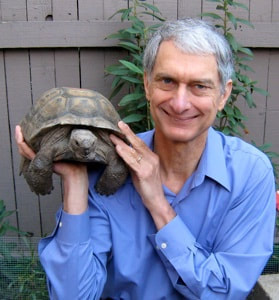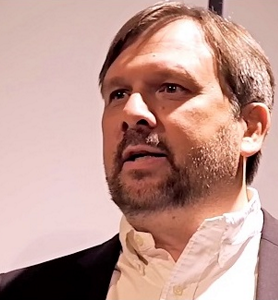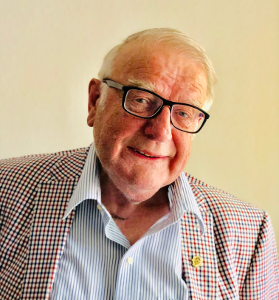David Seaborg's Biography
David Seaborg has taught biology at all levels from kindergarten to the university level, including the basic biology course at the University of California at Berkeley, university extension courses, courses at museums, field courses for all ages, at Burton Academic High School in San Francisco, and biology for elementary school.
He currently teaches various life science courses at the Osher Lifelong Learning Institute, which is part of the University of California at Berkeley extension program, and at the Fromm Institute for Lifelong Learning, at the University of San Francisco. |
David is President and Founder of the World Rainforest Fund, a nonprofit foundation dedicated to saving the earth’s tropical rainforests and biodiversity. He also founded and headed the Seaborg Open Space Fund, named in honor of his father, Glenn T. Seaborg, to raise money and awareness to save open space from development in central Contra Costa County. This fund raised $20,000 in less than a year to successfully help save Acalanes Ridge in Lafayette, California.
He wrote an article that is a summary of the scientific research on the effects of high atmospheric levels of carbon dioxide other than global warming. Unlike the climatic effects, these effects are not well known to the general public. They are very serious, and have the potential to cause high levels of extinction of species and greatly disrupt ecosystems and our food supply.
He was on the city of Lafayette’s General Plan Advisory Committee, which he guided to producing a ten-year General Plan for that city that emphasized environmental sustainability, preserving open space, combating global warming, and energy conservation.
In the 1990’s and part of the first decade of this century, he served on the Board of Directors and as Vice President of the Club of Rome of the USA, the environmental think tank that published the Limits to Growth in the 1970’s. This is a computer simulation study that showed that continued growth and consumption of resources will lead society to disaster.
He was on the Board of Directors of the East Bay Chapter of the United Nations Association of the U. S. A. from 2006 to 2009, where he was the lead environmental person. He gave the keynote address at their 2006 annual meeting, and helped secure the passage of key resolutions on biodiversity and global warming and the Kyoto Protocol, at the local, state, and national levels of the UNA/USA. These resolutions call for action on these issues by the U. N. and U. S. government.
He conceived, and helped secured passage by the Berkeley City Council, an ordinance banning the use of old growth rainforest and redwood in all products used by the city of Berkeley. This ordinance also required all businesses contracting with Berkeley to stop using old growth rainforest and redwood in any products or services Berkeley hires them to use or perform, or in any product they sell this city.
David conceived the idea for and was the head organizer for a press conference of Nobel Prize winners on global environmental issues that was held at the time of the 100th Nobel Prize ceremonies in Stockholm, Sweden, in December, 2001.
David has been to over 30 countries, observing various natural ecosystems and wildlife. He is an award-winning nature and wildlife photographer and an award-winning poet. He wrote the popular and acclaimed poetry book, Honor Thy Sow Bug, which sold over 1,500 copies. An excellent public speaker, he lectures to various scientific, environmental, civic, business, and other organizations on evolutionary biology, the philosophical implications of science, and environmental issues.
He wrote an article that is a summary of the scientific research on the effects of high atmospheric levels of carbon dioxide other than global warming. Unlike the climatic effects, these effects are not well known to the general public. They are very serious, and have the potential to cause high levels of extinction of species and greatly disrupt ecosystems and our food supply.
He was on the city of Lafayette’s General Plan Advisory Committee, which he guided to producing a ten-year General Plan for that city that emphasized environmental sustainability, preserving open space, combating global warming, and energy conservation.
In the 1990’s and part of the first decade of this century, he served on the Board of Directors and as Vice President of the Club of Rome of the USA, the environmental think tank that published the Limits to Growth in the 1970’s. This is a computer simulation study that showed that continued growth and consumption of resources will lead society to disaster.
He was on the Board of Directors of the East Bay Chapter of the United Nations Association of the U. S. A. from 2006 to 2009, where he was the lead environmental person. He gave the keynote address at their 2006 annual meeting, and helped secure the passage of key resolutions on biodiversity and global warming and the Kyoto Protocol, at the local, state, and national levels of the UNA/USA. These resolutions call for action on these issues by the U. N. and U. S. government.
He conceived, and helped secured passage by the Berkeley City Council, an ordinance banning the use of old growth rainforest and redwood in all products used by the city of Berkeley. This ordinance also required all businesses contracting with Berkeley to stop using old growth rainforest and redwood in any products or services Berkeley hires them to use or perform, or in any product they sell this city.
David conceived the idea for and was the head organizer for a press conference of Nobel Prize winners on global environmental issues that was held at the time of the 100th Nobel Prize ceremonies in Stockholm, Sweden, in December, 2001.
David has been to over 30 countries, observing various natural ecosystems and wildlife. He is an award-winning nature and wildlife photographer and an award-winning poet. He wrote the popular and acclaimed poetry book, Honor Thy Sow Bug, which sold over 1,500 copies. An excellent public speaker, he lectures to various scientific, environmental, civic, business, and other organizations on evolutionary biology, the philosophical implications of science, and environmental issues.



